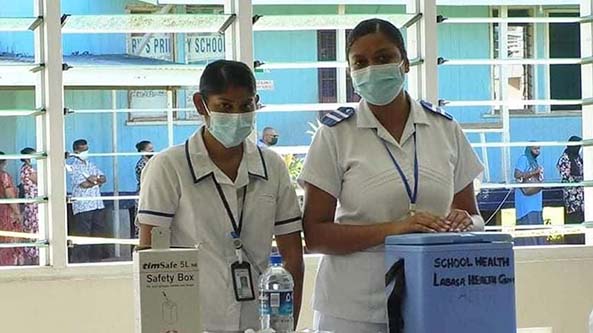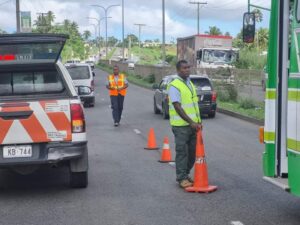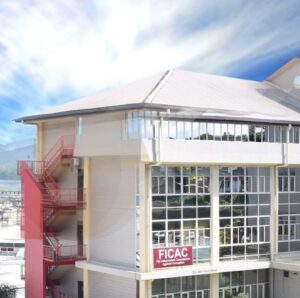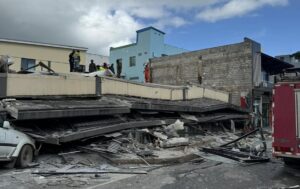Fiji’s Ministry of Health and Medical Services has identified six cases of measles, two in Labasa, three in Rewa, and one in Nasinu.
In a statement released this hour, the ministry says it has initiated an immediate containment response, which includes the management and isolation of confirmed cases, home quarantine of immediate family members, and contact tracing.
The Ministry has also put in place a plan of action for the respective medical sub-divisions including embarking on a supplementary vaccination campaign to protect high-risk groups.
Vaccination:
Vaccination is an essential response to outbreaks of measles.
The following groups will be included in the current campaign:
- All children aged 6 months to 11 years for the Rewa, Macuata, Suva, and Nasinu Medical Sub-Divisions will receive one dose of the measles vaccine.
- All children around Fiji who have turned 1, and those in year 6 who are yet to receive their measles vaccine are encouraged to turn up to the nearest health facility for their vaccination.
- The Ministry will continue to evaluate the target age group for the measles vaccination, depending on new cases confirmed and their age groups.
Signs and Symptoms of Measles
Measles is a highly contagious, serious, airborne disease caused by the measles virus, which is spread through the air and direct contact.
The virus infects the respiratory tract and spreads throughout the body. The signs and symptoms of measles are:
- High fever – which begins about 10 to 12 days after exposure to the virus lasting 4 to 7 days.
- A runny nose.
- Cough.
- Red and watery eyes.
- Small white spots inside the cheeks in the initial stage.
- After several days a rash erupts usually on the face and upper neck, within 3 days it spreads reaching the hands and feet lasting for 5 to 6 days.
Any individual presenting the above signs and symptoms is requested to wear a mask, avoid contact with others and visit their nearest health center for immediate attention and treatment.
Measles information
- Transmission
Measles is a highly infectious airborne viral disease that spreads easily through the air through breathing, coughing, and sneezing.
You are at risk of getting measles if you breathe the same air as someone with the disease and you are not immune.
You are not immune if you have not been vaccinated, or you have never had the disease.
- Symptoms
The symptoms of measles are:
Fever and a rash with any of the following: runny nose, sneezing, cough, red/watery eyes, white spots inside the mouth. The rash starts after the other symptoms and spreads all over the body.
- Treatment
There is no specific treatment for measles, as it is your body’s immune system that fights off the disease. Most people recover from measles infection in 8-10 days with rest and ensuring that they are eating and drinking to avoid dehydration.
- Complications
Some people infected with measles develop severe complications such as pneumonia (infection of the lungs) or encephalitis (swelling of the brain).
These people require hospitalization.
Any unvaccinated person is at risk of severe complications. Children under the age of five, babies younger than one-year-old, pregnant women, and those with compromised immune systems are most at risk of complications.
- Prevention
A safe and effective vaccine is available for the prevention of measles.
The Ministry of Health and Medical Services provides measles vaccine free to children. All children in Fiji are offered two doses of the combination measles-mumps-rubella vaccine – starting from twelve months of age.
Prior to the COVID-19 pandemic, Fiji’s routine immunization coverage for children was good. The Ministry also conducted a supplemental campaign in 2017 for all one to ten-year-olds and a mass vaccination campaign was also done during the 2019 measles outbreak for children between the ages of 6 months and 5 years old, and adults aged 19-39.
Please ensure your children have received at least two doses of the measles vaccine according to the Fiji immunization schedule.
This information should be in your child’s ‘Fiji Child Health Record’ (which is a booklet/card every child born in Fiji is provided) for children under the age of five and the school health card for school-aged children.
Children in the listed outbreak areas must also receive the supplementary measles dose in accordance with the outbreak response.
Measles in Fiji
Due to an effective immunization program, measles is rare in Fiji.
However, it is expected that routine childhood immunization coverage has dropped due to the COVID-19 pandemic, as it has in many other countries and this increases the risk of outbreaks.









